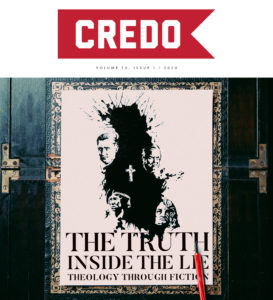Karen Swallow Prior is known for her love of literature and many of her readers love literature more because of her. Prior, who will begin her role as Southeastern Baptist Theological Seminary’s first research professor in the fall of 2020, graciously agreed to tackle some of our questions concerning the importance of fiction as it relates to theological formation and with our very own Jennifer Foster. While it is not surprising that names such as Jane Austen, Charles Dickens, and John Bunyan are mentioned throughout, what may surprise some readers is Prior’s attention to virtuous reading. As we read great books we not only gain insight into new ideas, but also develop as people. In Prior’s own words, “Literature helps me to see the world through other people’s eyes. It doesn’t demand that I agree with them, or that I experience what they experience, or retreat from my own real life. Rather, it deepens my understanding of others as well as my sense of myself and my own life.” Perhaps the following interview may not only deepen your understanding of Karen Prior, but also your understanding of yourself.
Your love for books has led you to a deep love of God. What is it about fiction in particular that drew you closer to Christianity?
The love of fiction I developed from the time I was a small child grew from reading wonderful, enchanting stories—stories about horses, dogs, boys, girls like me, girls not like me, magical places, and mundane places. Reading many, many stories cultivated my curiosity on a number of levels: imaginative, intellectual, and empathic.
My experience growing up in the church was generally positive, but the shunning of “worldly” ideas seemed to me an attempt to stifle curiosity and wonder. When a youth pastor told us that he once burned his records, I lamented the idea of a faith too weak to take on secular ideas. As I grew into a more sophisticated reader of literature and eventually pursued the life of a scholar, I thought I had to choose between the life of the mind and love of God. My experience growing up in the church was generally positive, but the shunning of “worldly” ideas seemed to me an attempt to stifle curiosity and wonder. Click To Tweet
But in graduate school, an unbelieving professor who learned that I was a Christian kindly pointed me to the intellectual heritage of the Christian tradition, a heritage which included the Puritans, the early novelists, and so many more. It was like I had finally arrived home. It was like everything in my life that had been fragmented and compartmentalized was stitched back together again. And I could finally see God as the one holding it all together. The words and stories I love exist only because of a God who is the Word.
You are in the habit of telling readers and writers not only to read a wide range of genres but also to read with virtue. What do you mean?
What I mean by reading with virtue is to read good things and to read them well.
In my first book, Booked: Literature in the Soul of Me (T.S. Poetry Press, 2012), I argued, following the seventeenth century Puritan poet John Milton, for reading widely—or in Milton’s terms “promiscuously.” But, since then, I have seen that as we have all become more and more immersed in the age of digital media, many of us are reading a great deal. But it’s becoming harder and harder to read well, to read virtuously.
Reading with virtue is about not just what we read, but also how we read. Certainly, some things can and should be read quickly, simply to gain information. But the more we engage in this kind of reading, the harder it becomes to practice the skills required to read writing that uses words artistically—in other words, literature—well. Literary art is meant to be savored, reflected upon, even re-read. Literary art demands—and deserves—virtues such as patience, diligence, and attentiveness. Such virtues are harder to attain in an age characterized by efficiency, hurry, and quantity over quality.
The great books are foreign to many today. When they are read, we ask them to teach us what to think. But you claim the great books can also teach us how to think. How so?
What makes great books so great is not just what ideas they convey (the content) but how those ideas are conveyed (the form).
The difference between a literary text and other non-literary writing is in the way in which language is used. Literary writing does more than transmit information. It uses language to re-create experience. A narrative or drama re-creates a series of events. A poem can re-create an impression. In other words, literary works show rather than merely tell. This is the formative quality of literature, which is different in kind, not only degree, from its informative quality. Some get frustrated with poetry, for example, because it doesn’t just come out and say something in a straightforward way. But life doesn’t either. Every day, we have to “read” people, situations, and encounters; we have to analyze, interpret, and evaluate. Good literature re-creates life in this way, not by hiding its meaning like a riddle, but by reflecting with words a slice of human experience. What makes great books so great is not just what ideas they convey (the content) but how those ideas are conveyed (the form). Click To Tweet
As the old adage puts it, art imitates life. But in doing so it offers us the opportunity to practice thinking in ways that we can then apply to our lives.
C.S. Lewis once wrote that approaching a literary work “with nothing but a desire for self-improvement” is to use it rather than to receive it. What’s Lewis after?
Lewis’s observation offers an important counterbalance to what I discussed above concerning the way literature can teach us how to think. Even though good literature does do this, this is not literature’s primary purpose.
Literature, like all art, is first and foremost to be enjoyed. As Aristotle remarked long ago in Poetics, human beings are the most imitative of creatures, and we take great pleasure in imitation. (Think of how a baby delights in imitating the facial expressions, sounds, and actions of those she sees, and how we delight in her imitations.) When we go to an art gallery, we observe a painting of a peach, not because we want to learn what a peach is, but because we marvel at the skill and imagination of an artist who can use paint and brush to render the image so well. We attend an opera not to learn the story of a Roman myth (although that is a delight as well) but for the pleasure of hearing songs skillfully sung. Likewise, we read literary art for the joy of it.
With that said, some of these joys are acquired tastes. Such pleasures deepen with knowledge and experience. In the same way that one can’t appreciate watching baseball very well without knowing the rules of the game, so being equipped with a bit of knowledge about the form of an art deepens the pleasure that allows us to receive it. Enjoying good literature, particularly that from times and places distant from ours does increase with greater practice and knowledge. Helping others to gain that is why I teach and why I write about literature.
I know it’s impossible to choose, but are there five novels every person should read, especially with the virtuous life in view?
My choices are ones that reflect my own tastes and interests, to be sure. But I do think these are objectively good, important novels that everyone should read:
-
- A Tale of Two Cities by Charles Dickens: I love all of Dickens, but this novel perhaps deals with virtue and vice most explicitly. I devote an entire chapter of On Reading Well (Brazos, 2018) on it because of the way it addresses the virtue of justice. There are many other virtues on display in the novel, too. Overall, this novel demonstrates the Aristotelian view of virtue as a moderation between two vices, one of excess and one of deficiency.
-
- Pride and Prejudice by Jane Austen: Austen is an author that the moral philosopher Alasdair MacIntyre considers as one of the last novelists to write based on an understanding of the classical virtues. Many who have not read Austen do not realize that her marriage plots are secondary to her concern with virtue. She uses the gentle satire to correct the vices prevalent in her world. (Although Pride and Prejudice is more accessible, I would also commend Sense and Sensibility for the same reasons.)
-
- Jane Eyre by Charlotte Bronte: As with Austen, the love story, although central to the plot, is less significant than the story this work tells of a modern soul—a Christian soul—on a quest to be true to God’s calling and her own conscience. It’s a journey we all undergo, though certainly, for most of us, in less dramatic circumstances. This is probably my favorite novel of all.
-
- The Remains of the Day by Kazuo Ishiguro: This is an exquisitely written work that is devastating in its slow build. It shows how seeming virtues can become vice.
-
- Huckleberry Finn by Mark Twain: This classic of American literature is humorous and entertaining, but it is also a profound portrayal of the virtue of courage. It also offers a devastating portrayal of how difficult it can be to know what is right within a society whose values are turned upside down. For this reason alone, it is timeless.
Christians sometimes assume that if a work of fiction says nothing explicit about God or theology, then it is irrelevant to the Christian life and view of the world. I’m guessing you disagree?
I certainly disagree. As Augustine famously said, all truth is God’s truth. What makes any work of literature good is that it reveals truth about the human experience and the reality of the universe as God created it. Certainly, there are many badly written works of fiction: those that do not tell the truth or do not demonstrate skill with the medium (language). There are also works of fiction whose purpose is not to be great art but simply to entertain. There’s nothing wrong with mere entertainment, of course.
 But literary fiction is a form of art that reveals not only truth, but beauty, too. When well done, fiction exalts the gift of language that God gave humankind and enhances our own skill with language simply by immersing us in a world created by it. To enjoy and cultivate our ability with language is to steward that image of God in which we are created.
But literary fiction is a form of art that reveals not only truth, but beauty, too. When well done, fiction exalts the gift of language that God gave humankind and enhances our own skill with language simply by immersing us in a world created by it. To enjoy and cultivate our ability with language is to steward that image of God in which we are created.
The virtue of patience is a major theme in Jane Austen’s Persuasion, especially with the character Anne. You write, “the most perfect patience grows out of not only teleology but eschatology too.” Whoever thought eschatology would show up in Jane Austen! What is Jane Austen trying to communicate?
Not only was Austen a Christian (and the daughter of a devoted Anglican clergyman) but her novels are thoroughly imbued with biblical thinking, language, and teaching. She was not an evangelical (a movement that was gaining strength around her during her lifetime), and her works were not meant to be explicitly Christian or didactic. But her Christian worldview is reflected in her art through and through. Austen recognized that there is a moral order and that society (even her own small slice of it) ought to reflect that order. She employed satire because she believed in the standards of manners and morality of which her characters fall short. Her novels (like so many great stories) end in marriage (or several marriages) as a reflection of biblical eschatology, which also ends in a marriage feast.
Imagination is essential to writing a powerful, lasting piece of fiction. You hold up John Bunyan’s The Pilgrim’s Progress as a model. Christians are fearful creativity might compromise the Christian faith, but can creativity serve to bring doctrine to life?
One of my graduate students is writing his Master’s thesis on this very topic. Most of us familiar with The Pilgrim’s Progress tend to think about its rich, deep theology—and rightly so. If we are familiar with the Puritans, we might also know that they were skeptical of fiction (for being untrue). Allegory is adjacent to fiction because it consists of symbols which point us to the truth that supersedes (or is supposed to supersede) the imaginative layer. My student is arguing in his thesis, however, that the imagination is much more at work in The Pilgrim’s Progress than many readers (and critics) realize.
We know that each character, event, and obstacle in the story is a symbol of some doctrinal truth. But the imaginative elements of the story provide an aesthetic experience that cannot be separated from the story’s theology or our application of it. In other words, the story embodies the way in which orthodoxy cannot be separated from orthopraxy, and how both of these develop from what we learn to love.
Because of the role played by the imagination, reading a work like The Pilgrim’s Progress (which was intended to be didactic) is not only informative but formative as well. In this way, literary understanding reflects the incarnation itself. Reading literature has helped me to be more like Christ. Click To Tweet
Aristotle was one of the first to introduce the cathartic effect that literature has on training emotions. Do you agree? Has Aristotle influenced your own love for literature?
Aristotle’s insights are significant and much recent research confirms what Aristotle intuited. This research has shown that people display more empathy after reading literary fiction, specifically. Researchers surmise that this is because literary fiction requires readers to make inferences about the feelings and actions of characters, a process that replicates what we do with real people.
I loved literature long before I read Aristotle, but his ideas have given a foundation for what I experienced and understood on my own. Literature helps me to see the world through other people’s eyes. It doesn’t demand that I agree with them, or that I experience what they experience, or retreat from my own real life. Rather, it deepens my understanding of others as well as my sense of myself and my own life. Experiencing vicariously the suffering and successes of others through fiction has helped me to understand my own suffering and successes, and to place the emotions that come with them within a broader context of understanding.
In this way, literary understanding reflects the incarnation itself. Reading literature has helped me to be more like Christ.
Photo credit: Giorgia Pallaro, federica_9952



